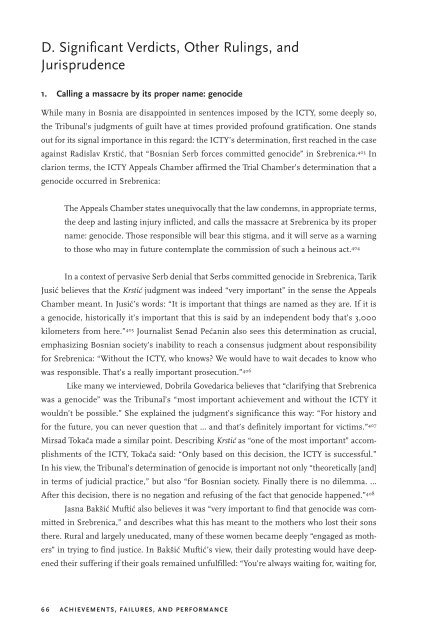That Someone Guilty Be Punished - Open Society Foundations
That Someone Guilty Be Punished - Open Society Foundations
That Someone Guilty Be Punished - Open Society Foundations
Create successful ePaper yourself
Turn your PDF publications into a flip-book with our unique Google optimized e-Paper software.
D. Significant Verdicts, Other Rulings, and<br />
Jurisprudence<br />
1. Calling a massacre by its proper name: genocide<br />
While many in Bosnia are disappointed in sentences imposed by the ICTY, some deeply so,<br />
the Tribunal’s judgments of guilt have at times provided profound gratification. One stands<br />
out for its signal importance in this regard: the ICTY’s determination, first reached in the case<br />
against Radislav Krstić, that “Bosnian Serb forces committed genocide” in Srebrenica. 403 In<br />
clarion terms, the ICTY Appeals Chamber affirmed the Trial Chamber’s determination that a<br />
genocide occurred in Srebrenica:<br />
The Appeals Chamber states unequivocally that the law condemns, in appropriate terms,<br />
the deep and lasting injury inflicted, and calls the massacre at Srebrenica by its proper<br />
name: genocide. Those responsible will bear this stigma, and it will serve as a warning<br />
to those who may in future contemplate the commission of such a heinous act. 404<br />
In a context of pervasive Serb denial that Serbs committed genocide in Srebrenica, Tarik<br />
Jusić believes that the Krstić judgment was indeed “very important” in the sense the Appeals<br />
Chamber meant. In Jusić’s words: “It is important that things are named as they are. If it is<br />
a genocide, historically it’s important that this is said by an independent body that’s 3,000<br />
kilometers from here.” 405 Journalist Senad Pećanin also sees this determination as crucial,<br />
emphasizing Bosnian society’s inability to reach a consensus judgment about responsibility<br />
for Srebrenica: “Without the ICTY, who knows? We would have to wait decades to know who<br />
was responsible. <strong>That</strong>’s a really important prosecution.” 406<br />
Like many we interviewed, Dobrila Govedarica believes that “clarifying that Srebrenica<br />
was a genocide” was the Tribunal’s “most important achievement and without the ICTY it<br />
wouldn’t be possible.” She explained the judgment’s significance this way: “For history and<br />
for the future, you can never question that … and that’s definitely important for victims.” 407<br />
Mirsad Tokača made a similar point. Describing Krstić as “one of the most important” accomplishments<br />
of the ICTY, Tokača said: “Only based on this decision, the ICTY is successful.”<br />
In his view, the Tribunal’s determination of genocide is important not only “theoretically [and]<br />
in terms of judicial practice,” but also “for Bosnian society. Finally there is no dilemma. …<br />
After this decision, there is no negation and refusing of the fact that genocide happened.” 408<br />
Jasna Bakšić Muftić also believes it was “very important to find that genocide was committed<br />
in Srebrenica,” and describes what this has meant to the mothers who lost their sons<br />
there. Rural and largely uneducated, many of these women became deeply “engaged as mothers”<br />
in trying to find justice. In Bakšić Muftić’s view, their daily protesting would have deepened<br />
their suffering if their goals remained unfulfilled: “You’re always waiting for, waiting for,<br />
66 ACHIEVEMENTS, FAILURES, AND PERFORMANCE

















